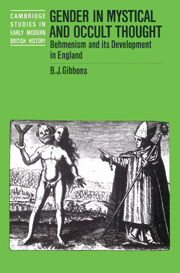Book contents
- Frontmatter
- Contents
- Acknowledgements
- 1 Introduction
- 2 Gender, sexuality and power in early modern England
- 3 Gender in mystical and occult thought
- 4 Gender in the works of Jacob Boehme
- 5 The reception of Behmenism in England
- 6 Behmenism and the Interregnum spiritualists
- 7 The female embassy
- 8 Conservative Behmenism
- 9 Wider Behmenist influences in the eighteenth century
- 10 Conclusion
- Bibliography
- Index
- Cambridge Studies in Early Modern British History
1 - Introduction
Published online by Cambridge University Press: 03 November 2009
- Frontmatter
- Contents
- Acknowledgements
- 1 Introduction
- 2 Gender, sexuality and power in early modern England
- 3 Gender in mystical and occult thought
- 4 Gender in the works of Jacob Boehme
- 5 The reception of Behmenism in England
- 6 Behmenism and the Interregnum spiritualists
- 7 The female embassy
- 8 Conservative Behmenism
- 9 Wider Behmenist influences in the eighteenth century
- 10 Conclusion
- Bibliography
- Index
- Cambridge Studies in Early Modern British History
Summary
Since the arrival of the ‘second wave’ of feminism in the 1960s, several writers have re-examined the role of women in religion and the gender identity of God. The new feminism was itself part of a broader cultural phenomenon in which other, partly complementary and partly contradictory, trends were occurring. One such trend was the so-called ‘sexual revolution’, to which the new feminists have an ambivalent attitude. Another trend was the emergence of New Age spirituality, involving a broad religious eclecticism, ranging from Eastern religions to neo-paganism and the Western occult tradition. Inevitably, the meeting of the New Age and the new feminism produced a crop of books devoted to the cult of the goddess.
Like feminist scholarship in general, much feminist theology has been concerned with seeking roots and precedents. This book is devoted to the followers of a man who, in some ways, seems to be a precursor of the cultural trends of the last three decades, Jacob Boehme. Behmenism, as the English have traditionally called Boehme's theosophy, is itself a system of beliefs involving a revaluation of divine gender. If the emphasis of early Behmenists on chastity is incompatible with the ‘sexual revolution’, it might at least claim some affinity with radical and separatist feminism. The later validation of sexuality among some Behmenists bears a superficial resemblance to the sexual mysticism sometimes found in New Age spirituality. Behmenism is in fact rooted in the occult tradition which has influenced this spirituality. Apart from these considerations, a study of Behmenism offers the opportunity to investigate the complex relationship between religion, gender and sexuality in the emergence of modern society.
- Type
- Chapter
- Information
- Gender in Mystical and Occult ThoughtBehmenism and its Development in England, pp. 1 - 19Publisher: Cambridge University PressPrint publication year: 1996



